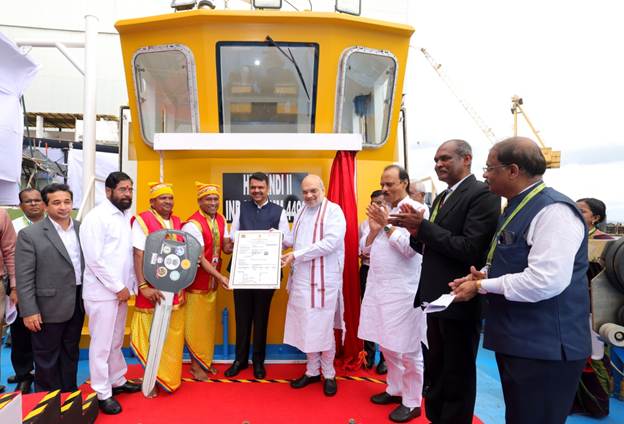Union Home Minister Amit Shah on Monday inaugurated ‘Deep Sea Fishing Vessels’ under the Pradhan Mantri Matsya Sampada Yojana (PMMSY) at Mazgaon Dock, Mumbai, marking a major step towards modernising India’s marine fisheries sector and strengthening the cooperative movement along the nation’s coastline.
The event was attended by Maharashtra Chief Minister Devendra Fadnavis, Deputy Chief Ministers Eknath Shinde and Ajit Pawar, and Union Minister of State for Cooperation Murlidhar Mohol.
Speaking on the occasion, Amit Shah said that under the leadership of Prime Minister Narendra Modi, the initiative represents a significant stride towards achieving the vision of ‘Aatmanirbhar Bharat’ and expanding India’s blue economy through cooperative-based development. “The inauguration of these two trawlers today will enhance India’s capacity to harness its fisheries wealth while ensuring that profits reach the homes of our hardworking fishermen through cooperatives,” Shah stated.
The Union Minister explained that while most fishermen currently work on trawlers as salaried employees, the government’s new cooperative model will allow them to share directly in the profits of their work. Initially, 14 trawlers will be distributed, with plans to provide more in the coming months. Each trawler is capable of staying at sea for up to 25 days and carrying 20 tonnes of fish, with larger vessels to coordinate operations and transport the catch from sea to shore. These trawlers are also equipped with modern living and dining facilities.
Shah revealed that a major national fisheries scheme is in the pipeline to benefit the millions who depend on fishing along India’s 11,000-kilometre-long coastline. Emphasising the inclusive spirit of cooperation, he said, “Whether it is milk production, agriculture, or fisheries, the profit must belong to the hardworking individual. True national prosperity is achieved when the poor in rural India become economically empowered.”
He also underlined that economic growth must go hand in hand with human development. “Those who view the nation’s prosperity only through the lens of GDP fail to understand the social structure of India. Real progress comes when every family can educate its children, eat well, care for its elders, and live self-reliantly,” he said.
The Minister highlighted the significant growth in India’s fisheries sector under the Modi government. Total fisheries production has risen from 102 lakh tonnes in 2014–15 to 195 lakh tonnes, while domestic freshwater production has increased from 67 lakh tonnes to 147 lakh tonnes, and marine output from 35 lakh tonnes to 48 lakh tonnes. “Our vast coastline offers immense potential for further growth, and through cooperatives, we will ensure that the benefits reach every fisherman’s home,” Shah said.
He added that the Ministry of Cooperation is working on plans for fish processing, exports, and the establishment of chilling centres and collection ships, all managed by cooperatives. “Processing will be done by fishermen, chilling centres will belong to them, and exports will be facilitated through multistate export cooperatives,” he said.
Drawing parallels with successful cooperative models, Shah cited Maharashtra’s sugar mills and Gujarat’s Amul, noting that these examples demonstrate how cooperatives can transform rural economies. “The ₹80,000 crore business run by Amul today benefits millions of women, many of whom are uneducated. This cooperative spirit—where prosperity reaches the grassroots—is the true philosophy of India,” he remarked.
The launch of deep sea fishing vessels under PMMSY marks a key milestone in India’s efforts to promote sustainable fishing, empower coastal communities, and strengthen the cooperative framework as a driver of inclusive economic growth.














